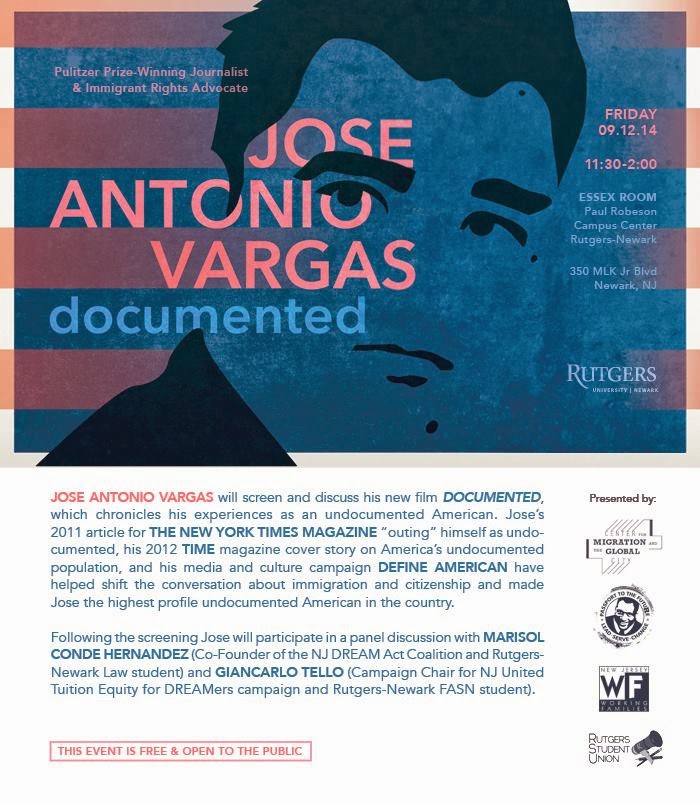Last Friday I had the opportunity to go the Newark campus of Rutgers University to see Jose Antonio Vargas speak. Prior to showing his movie Documented, the moderator asked us to keep our cell phones on since the purpose of the movie was to encourage conversation on Twitter or Facebook. Quite honestly, I didn’t think anyone was on social media since there were so many of us brought to tears by the film. Although I have seen this film I cried at the point in the narrative when Jose realizes that he does not quality for Deferred Action for Childhood Arrivals or DACA (which allows those that were brought here as children to legally work) because of his age. I also cried seeing his mother react to him not acknowledging her as his mother on FB. He did this to ensure that nobody would ask too many questions and delve into his history. I have employed such tactics before and understand where he was coming from. If we are not “out”, we undocumenteds (or formerly undocumenteds) don’t want to talk about the life we had prior to arriving here. Please note that Jose and his mother have not seen each other in approximately 2 decades due to wait times in getting her a visa although she is being sponsored by her mother. Also there is difficulty in obtaining a tourist visa since she is not working in the Philippines (opportunities are far and few over there). She might be viewed as a prime candidate for overstaying her visa without a job to keep her in the Philippines.
Thursday, September 18, 2014
Wednesday, September 3, 2014
Ghost of Jose Rizal
The reclamation of my Filipino identity has naturally led me
to Jose Rizal and his works. I have completed his two novels, Noli Me Tangere
(Touch Me Not) and El Filibusterismo. The words Noli Me Tangere (Touch Me Not) comes
from the Latin version of words spoken, according to John 20:17 (King James
Version), by Jesus to Mary Magdalene when she recognized him after his
resurrection. He said “Touch me not; for I am not yet ascended to my Father.” Historians have also noted that the title is a reference to
cancer of the eyelids as Jose Rizal was also an ophthalmologist.
The novel opens with a letter of a patriot to his country. It is
an awareness that something has gone wrong with the health of the nation. The
patriot viewed it as a cancer and that in his writing, he would attempt to
“lift the veil hiding your ills, and sacrifice everything to truth, even my own
pride, since, as your son, I, too, suffer your defects and shortcomings.”
The main character, Crisóstomo Ibarra is much like its author
having spent some time in Europe to be educated and then returns home to the
Philippines. His hope is to reunite with his childhood sweetheart María Clara
and get to know his country again. The first chapter is a dinner party thrown
by a family friend Captain Tiago, Maria Clara’s father, attended by the upper
echelons of the town which includes Dominican and Franciscan friars described
by Dr. Rizal as “…the
parasites, spongers, and freeloaders that God, in his infinite goodness, has so
lovingly multiplied in Manila.” The party reads as if acted on stage where each
character is posturing as something other than the truth.
The novel progresses with what seems like the veil lifting from
Ibarra’s eyes as his idealism is corrupted by loss. First it was finding out
the circumstances of his father, Don Rafael’s death. Ibarra’s father was
accused of heresy and then after a series of other events is imprisoned. Don
Rafael dies in prison and his body is eventually exhumed and then thrown in a
lake. While Ibarra performs extraordinary acts of beneficence, like building a
school, his intent grows darker with vengeance towards the priest that rendered
Don Rafael’s fate.
In addition to this story, Dr. Rizal includes snippets of the
lives surrounding Ibarra where the absurdity and abuses of the clergy and those
in power are evident. The most important vignette is the intersection of Ibarra
and a man named Elias. At some point Elias forebodes that “Without freedom
there is no light…You don’t see the preparations for struggle, you don’t see
the cloud on the horizon. Combat begins in the sphere of ideas, to descend into
the arena, which will be colored with blood”. In the end, their fates are
intertwined and the reader becomes uncertain which man is the fugitive and
which is the patriot.
Subscribe to:
Posts (Atom)

